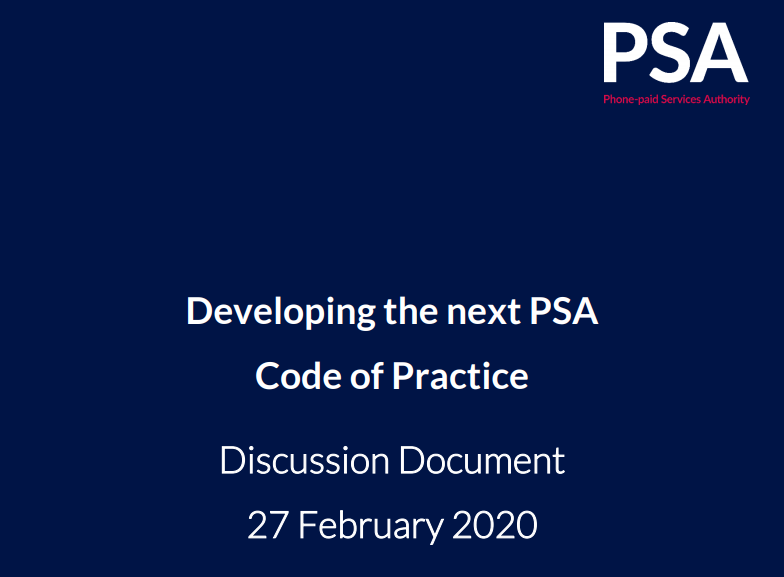We urge the public to get involved in this consultation. The Phone-paid Services Authority seem determined to avoid consumer involvement, but they can’t stop us responding to their consultations.

Details of the consultation are here: https://psauthority.org.uk/research-and-consultations/consultations/2020/march/code-15-discussion-document
The consultation closes on 2nd July 2020. Our full draft response is here (pdf).
https://payforitsucks.co.uk/wp-content/uploads/2020/05/Response-to-PSA-consultation-on-Code-15.pdf
These are our thoughts about the changes we would ideally like to see – a wish list. If even a few of these things could be implemented it would help greatly.
- An end to the presumption by PSA that third party charges on phone bills are lawful unless proved otherwise. The reverse is actually the case. In UK law the burden of proof rests with the vendor to prove the existence of a contract, not with the consumer to prove that it didn’t exist. Unless there is proof that a consumer has lied, they should be assumed to be telling the truth. It is upsetting for consumers when PSA effectively accuse them of lying when they know this is not the case and there is no evidence to support that view.
- Much greater involvement and responsibility on the part of the Mobile Network Operators. Proof of “consent to charge” should be in their possession before they apply these charges to consumer accounts. This evidence should be provided to consumers if they query a charge.
- A move to a more prescriptive code. It is our view that the current “outcomes based” code is difficult to enforce, as the outcomes are expressed in subjective terms. This makes it more difficult for PSA to sanction errant vendors. Consideration should be given to setting performance indicators relating to the proportion of complaints generated by a service.
- The ability for PSA to suspend services that generate large volumes of complaints before conducting a full investigation. One of the most serious faults with the existing code is that “services” like ModoMobi are allowed to continue while PSA “investigates” them. “Services” like this should be suspended once it becomes evident that they are generating a disproportionate volume of complaint. The recent case of Salvatet Inversiones is an example of this. The service caused massive consumer harm, much of it to vulnerable consumers. However, it was allowed to continue generating revenue throughout the investigation and right up to the Tribunal date. The £1m fine imposed has little chance of ever being collected and the directors of the company will pocket over £2m in revenue. This disgraceful inability of PSA to effectively sanction bad actors has to be addressed in Code 15.
- A “chargeback” mechanism to redress the balance of power between the vendor and the consumer. Consumers should be able to get charges reversed, particularly where the MNO can provide no evidence that the consumer has consented to them. Vendors can then pursue the consumer for the charge, if they are able to substantiate it. This reverses the current system where consumers have to commence legal action of their own to recover unlawful charges.
- Greater consultation with real consumers. The existing Consumer Panel needs to be replaced with one that is genuinely in touch with the views of consumers, particularly those unfortunate enough to become victims of this form of fraud. PSA should hold meetings/webinars with interested consumers in the same way as they do with the industry.
- A requirement that networks provide a facility for consumers to opt-out of Phone-paid Services in their entirety (a “charge to bill” or “charge to mobile” bar). Many networks already offer this facility, but it needs to be mandatory for all networks to provide it. Consumers should be asked when taking out a contract whether they want to enable phone-payment. This would protect children, the elderly and the vulnerable from being unwittingly exposed to the fraud and sharp practices endemic in the industry.
- A requirement that networks are able to stop recurring charges themselves, without referring the consumer to the vendor. All other payment processors are able to do this and it is not unreasonable for consumers to expect it..
- A requirement that indefinite subscriptions be regularly “renewed” if there has been no interaction with the service. The “Payforit” scheme had a 120 day rule for subscription services, although nobody ever seems to have enforced it. This will prevent “cramming” fraud where regular, unauthorised, small charges go unnoticed by consumers, sometimes resulting in the loss of hundreds of pounds. If a service hasn’t been used for a period, the consumer should be asked to re-confirm the subscription. If it isn’t re-confirmed it should lapse, and no further charges should be made.
- In an ideal world we’d like to see the telecom exemption from regulation under PSD2 removed in its entirety. Realistically though we’d like PSA to take a look at the way in which other payment processors are required to work and modernise the requirements for phone-payment.
- The funding model needs to be re-examined. PSA correctly observe that many services and service types generate very few complaints, while others generate a disproportionate number of complaints. We suggest that he levy should be adjusted so that the cost of regulation falls more heavily on services which generate the most complaints. A “polluter pays” approach to the funding of Phone-paid Services Authority might help in cleaning up the industry.
- All services should be required to be the responsibility of a UK company. Many of the complaints in recent years have related to services operated by companies based overseas in Cyprus, Belize, the UAE and numerous other jurisdictions. It has become clear that PSA experience great difficulty in enforcing the code against these companies and consumers experience similar difficulty in obtaining redress for unlawful charges. While we would not wish to preclude overseas companies from offering Phone-paid Services in the UK it is essential that they are subject to UK law including the Small Claims procedure.

